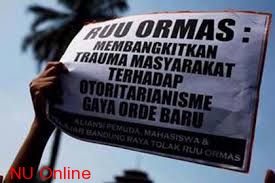"NU did not file judicial review against mass organizations bill"
Senin, 22 Juli 2013 | 09:32 WIB
Jakarta, NU Online
The Indonesia's largest Muslim organization Nahdlatul Ulama (NU) said it did not file a judicial review against the mass organizations bill to the Constitutional Court (MK), although some articles in the bill set earlier this month were not in line with the NU aspirations.<>
"NU did not participate in filing a judicial review. We just support it morally. Why? Because their motive (in filing the judicial review) is rejecting the mass organizations bill. While NU from the beginning has accepted the Draft Law on Mass Organizations critically," Deputy Secretary General of NU H Enceng Shobirin Najd told NU Online here on Monday (22/7).
According to Enceng, NU still objected to some articles in the highly-debated mass organizations bill passed on July 2, 2013 by the House. Firstly, from the beginning of the discussion of the draft, NU has again called for the distinction between organization, foundation, association, and foreign-owned institution.
"Mass organization and foundation are really different. The former belongs to its members, not its founders. While the latter is personal for being owned by a few people," he said.
Secondly, NU wanted the mass organizations bill to regulate mass organizations with a legal entity status.
"All mass organizations must have a legal entity status, (and) receive the applicable provisions of law," he said, adding while the mass organizations bill passed by the House did not include mass organizations having no legal entity status.
Thirdly, NU based itself on the decision of the NU National Conference I983 in Situbondo which accepts Pancasila as the principle of mass organizations. While in the mass organizations bill just states that "the principle of mass organizations is not contrary to the Pancasila".
According to Enceng, NU was disappointed with the special committee of the mass organizations bill for serving a particular group's interests. He said the committee clearly followed the desire of the Prosperous Justice Party (PKS), which does not accept Pancasila as a principle.
As reported by Kompas.com, the House of Representatives finally passed the controversial mass organization bill into law through a vote despite massive debates over the bill’s impact on democracy.
The country's leading media reported that 311 lawmakers supported the bill while 50 opposed it. The supporters comprised of 107 Democratic Party lawmakers, 75 from the Golkar Party, 62 from the Indonesian Democratic Party of Struggle (PDI-P), 35 from the Prosperous Justice Party (PKS), 22 from the United Development Party (PPP) and 10 from the National Awakening Party (PKB).
Meanwhile, those who were opposed numbered 24 from the National Mandate Party (PAN), 18 from the Great Indonesia Movement (Gerindra) and six from the People’s Conscience (Hanura) Party.
The bill was approved by the House despite mass protests from activists and mass organizations in which they considered the bill would limit the power of people to assemble. The activists believed that the new law would become a means to suppress organizations critical of the government.
Reporting by A. Khoirul Anam; Editing by Sudarto Murtaufiq




